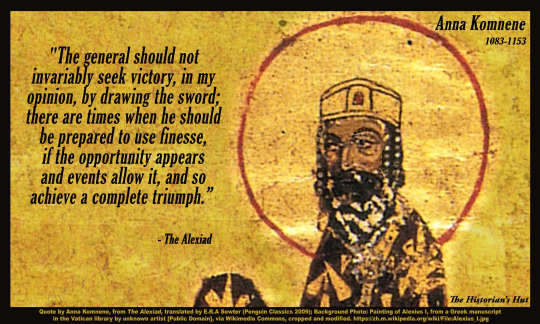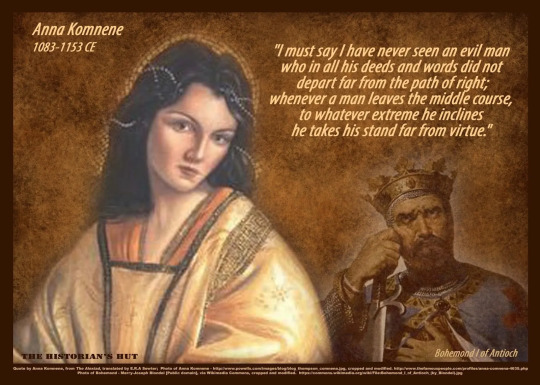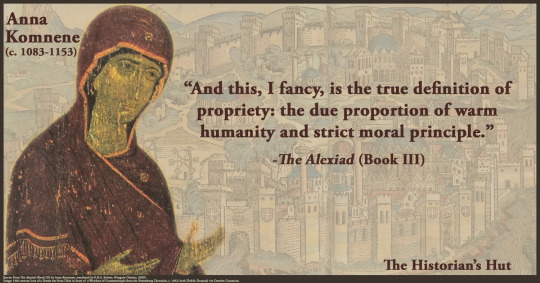#anna komnene porphyrogennite
Explore tagged Tumblr posts
Note
What was women's position in the Byzantine Empire? I haven't searched that much, but it seems like her position wasn't any different from Ancient Greece, where they were expected to be modest, silent and it was generally preferable not to be heard (at least, women from aristocratic families).
Well you won’t find easily a medieval state which did not want women to be modest and quiet.
In spite of that, no that’s not true. The place of the woman in the society improved considerably in Byzantine times compared to the Classical era. As a sidenote, perhaps we should not generalize about Classical Greece either, especially when we apply the reality of Athens to all the Greek world without enough evidence that this is historically accurate, at a time when Athens was extremely obsessed with ¨male perfection¨.
Based on our view of things nowadays, it might seem counterintuitive, however Christianity played a huge role in this improvement. You see, the Bible through its scriptures and also the very example of Virgin Mary, whom the Byzantines (and later the Modern Greeks too) worshipped almost equally to Christ, as well as the church’s acknowledgement and veneration of women martyrs indiscriminately from men martyrs, made it clear that women were spiritually equally capable of achieving “théosis”, meaning resemble the image of God, in other words; sainthood. It was thus deemed important that women would be able to read and study the scriptures. As a result the Byzantine empire had the highest literacy rate of women in the Middle Ages.
Intercepting for those who might wonder: "But the Ancient Greek religion had gods and goddesses alike, so why wouldn't that improve the social status of women?". The answer is because in the Ancient Greek religion there was no concept of théosis, meaning any human's strive to achieve a moral perfection to resemble the image of God. The dynamics of gods and godesses were separate from those of the people, where women were left to be evaluated by and versus men alone.
Women were nowhere as confined as the women of classical Greece. Of course they should be good wives and mothers catering to their household first and foremost but they could participate in social events, festivals, go shopping, lather in the baths and have fun like men did. As wives, their status was also better, as according to Christianity all god-fearing men were supposed to be loyal to their wives and have no concubines. So, if a man really had no intention to be faithful at all, neither to his wife nor to the Christian teachings, he at least did it discreetly, and if he did not do even that, then he did not escape the judgement of the society. Divorce was hard for either spouse to ask, of course waaay more for women, but for example Justinian enforced an iconic law that if a couple wanted to take a divorce then BOTH spouses should go to monasteries and be celibate for life lol So you know, be cruel, but at least be indiscriminately cruel! 😂
Financially, dowries and inheritance remained a woman’s property after marriage unlike in classical times. If the husband died, it was the widow’s choice whether she would marry again or not and she was in charge of her children on her own whereas in classical times women had to marry their husband’s closest relative (to “protect” them and the property that had now passed on their own family). So, really no contest there. Women owned and ran businesses and signed contracts. They were employed in a wide range of professions.
As for the aristocrats, they had it much better than classical aristocrats. They did not work like lower class women, obviously, so they filled all that extra time by being pampered by their servants (female and male, sometimes eunuchs), who were usually exclusive to them. Depending on the lady’s interests, the servants would keep her entertained by playing music, reading to her, gossiping, grooming her etc Some women hired teachers to improve on their education on their own accord. Wives of important men were usually involved in political and diplomatic affairs and they were very interested in such matters. Educated women could be doctors (for women).
Nuns, who did not have the burden of taking care of the children and a husband, often became studious and pretty educated, with artistic concerns, like Kassiani. And to go back to the ask, there are accounts of Byzantine princesses being perceived in West Europe as “too talkative” and “too concerned with themselves”, so apparently Byzantium gave its aristocratic women a lot more liberty than, say, Classical Athens and also more than Western Europe did.
And then of course the Byzantine Empire was the only medieval state to have ever been reigned by four women on their own, and some of them were very consciously and ambitiously pursuing the throne. But even the empresses consorts, meaning the wives of the emperors, were also expected to be well acquainted with all the matters of the empire in case something happened to the emperor because they had to stand in his place temporarily or even serve as regents. From the 22 pages in Wikipedia about Byzantine regents, the 7 are about women, so one third, at least from the well known ones.
Women were also interested in their appearances and really took matters in their hands. Rich women would have special gardens cultivating flowers and spices to create their own perfumes. Michael Psellos writes about how Empress Zoe had essentially turned herself into a chemist, making the basements of the imperial palace a lab for perfumes and elixirs to maintain her youthful appearance.
And let’s end this with some quotes from Anna Komnene’s Alexiad (inspired by the Iliad she so loved), the chronicles of her father’s Emperor Alexius exploits in war.

12th-century manuscript of the Alexiad
The Alexiad is invaluable because it remains one of the richest sources of information historians possess about the military, social and imperial history of the Byzantine Empire.







Ah I had written before about that stuff and I meant to write something short this time but I just can’t do it when it’s about Byzantium my love adefefajdhhajhf
#history#byzantine empire#eastern roman empire#women#byzantine history#byzantine culture#east roman empire#byzantine greek culture#greek history#greek culture#middle ages#women in history#anna komnene#anna komnene porphyrogennite#anna comnena#attichoney4u#ask#long post#tw long
80 notes
·
View notes